UNITED STATES –Analysts at the Pew Research Center have released a second report parsing data collected during the 2014 Religious Landscape Survey. Where the initial report “described the changing size and demographic characteristics of the nation’s major religious groups,” this second one instead “focuses on Americans’ religious beliefs and practices and assesses how they have changed in recent years.”
While the activities of those who belong to religious minorities, including those who fall under or near the Pagan umbrella, can at best be inferred from the data — out of 35,071 survey participants, only 605 are listed in the “other faiths” category, which was separate from the 92 identified under “other world religions” — the overall trends in the United States suggest a slow, generational shift away from any religious activity. However, among those who hold religious beliefs, the frequency and variety of religious activities has not appreciably changed since the first survey, conducted in 2007. Those interested in digging into the data have, for the first time this year, an interactive tool for combing through the results as well as the full report in PDF format.
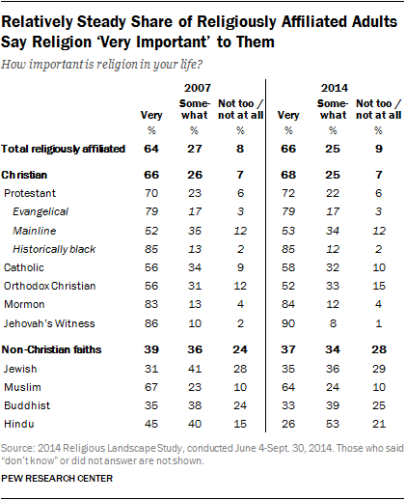
While 70.6% of the survey respondents indicating that they are some type of Christian, some of the questions suggest that the survey itself was written by people who are largely unfamiliar that other perspectives exist. That includes the finding that a “growing share of religiously affiliated say they regularly read scripture, participate in prayer or scripture study groups, share faith with others” – all activities strongly associated with Christian faiths in particular.
Another section of the report notes that a “declining share of Americans express absolutely certain belief in God.” The report further indicates that six-in-ten respondents “believe the Bible or other holy scripture is the word of God.” It’s not clear if or how the wording of questions impacted responses from, for example, the 456 Hindus or responded. Additionally, while the results are parsed by gender in several sections of the report, no allowances are made for non-binary respondents.
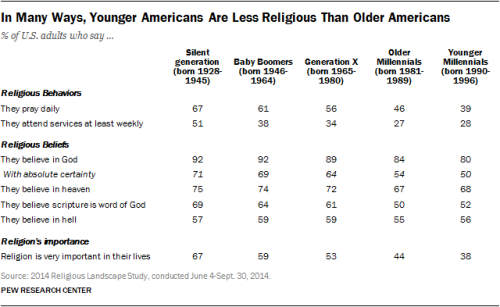
One thing made clear by the new survey is that the number of “nones” — those who do not identify as affiliated with a particular religion, including atheists — continues to rise. This population went from 16% in 2007 to 23% in the 2014 survey. That progression has not been homogeneous: younger people are more likely not to identify as religiously affiliated than older Americans, and is more widespread among respondents who listed themselves as Democrats or Democrat-leaning.
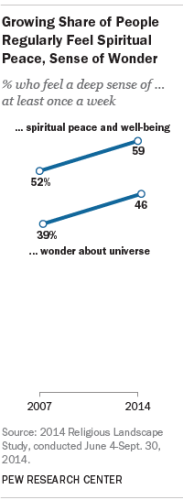 One pair of findings which might suggest a Christian bias to the survey is the the “nones” are less likely to believe in God than they did seven years ago. At the same time, feelings of spiritual peace and wonder at the universe increased among the religious and non-religious alike. By separating “spiritual” from “religious” activities, Pew researchers may have created a distinction that only represents a difference in certain faith communities, albeit the majority ones in the United States today. Given that unspoken definition, it appears that those with a religious affiliation are loathe to give it up, but members of the millennial generation are more likely not to have picked one up in the first place. While no one appears to be abandoning religion, the percentage of people who practice one is still on the decline.
One pair of findings which might suggest a Christian bias to the survey is the the “nones” are less likely to believe in God than they did seven years ago. At the same time, feelings of spiritual peace and wonder at the universe increased among the religious and non-religious alike. By separating “spiritual” from “religious” activities, Pew researchers may have created a distinction that only represents a difference in certain faith communities, albeit the majority ones in the United States today. Given that unspoken definition, it appears that those with a religious affiliation are loathe to give it up, but members of the millennial generation are more likely not to have picked one up in the first place. While no one appears to be abandoning religion, the percentage of people who practice one is still on the decline.
Among those who adhere to a specific religion, the survey found that the distribution from highly religious to those who are less so hasn’t significantly changed from one survey to the next. Similar percentages of respondents attend worship services, pray, and express belief in their deity as did in 2007. The bulk (57%) of those identifying as having a religion conceive of “God” as a person rather than an impersonal force, including 70% of Christians. C
uriously, 2% of atheists said that the believe in a personal deity. There’s been no appreciable change in conception of deity — among the religious — from one survey to the next.
Two highly political issues were also called out in the survey, with questions on topics such as homosexuality and abortion. Across the board, the percentage of people who accept homosexuality is on the rise, with increases shown in every faith group, including Mormons, whose church recently ruled that members in same-sex marriages are to be considered apostate, and their children denied baptism until they reach adulthood. (It’s not clear if the mass resignations spurred by that decision will change the overall attitude of Mormons in future surveys, however.)
Belief that abortion should be legal in all or most cases, however, hasn’t really changed overall since the 2007 survey was performed. What’s interesting about the abortion data is which groups trended in what direction: the nones are more supportive of the right to choose an abortion, while there was a slight downtick among non-Christian faiths, of which most of the respondents belong to another Abrahamic group. While generational trends drift toward more liberal views on issues other than homosexuality, namely the environment, immigration policy, and the proper size and scope of government. Abortion, however, has its opponents strewn throughout all age groups.
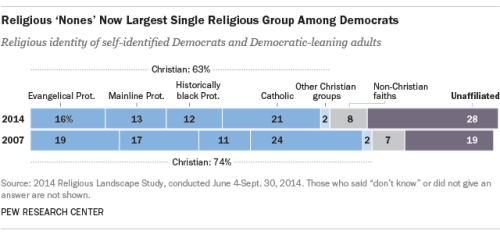
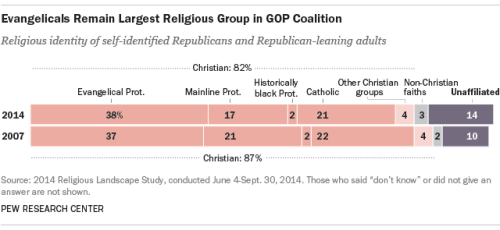
Given the relatively small number of people who practice any sort of Heathen, Pagan, or Polytheist religion, trends in these communities are impossible to track in such a large survey. It’s entirely possible that trends toward less religious involvement in younger people do impact the growth of these religions, but as they are generally adopted in adulthood, and without attempts at conversion. It’s also possible that those in the shadow of the Pagan umbrella are bucking these trends completely. Unless and until this amalgam of faith groups and solitary practitioners grows to the point of making a statistically significant blip on the national stage, focused surveys such as the Heathen census will serve to provide more meaningful data about who we are and what we do.
The Wild Hunt is not responsible for links to external content.
To join a conversation on this post:
Visit our The Wild Hunt subreddit! Point your favorite browser to https://www.reddit.com/r/The_Wild_Hunt_News/, then click “JOIN”. Make sure to click the bell, too, to be notified of new articles posted to our subreddit.
It is important to remember that Pew does have a Christian bias and it is probably reflected in the way the survey is written. At the moment it is the only polling group doing this work and thus its results are given more weight than they probably deserve.